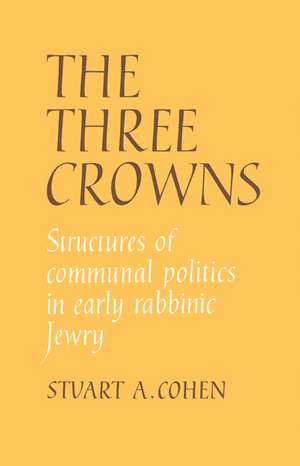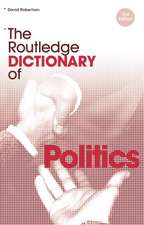The Three Crowns: Structures of Communal Politics in Early Rabbinic Jewry
Autor Stuart A. Cohenen Limba Engleză Paperback – 2 dec 2007
| Toate formatele și edițiile | Preț | Express |
|---|---|---|
| Paperback (1) | 261.93 lei 6-8 săpt. | |
| Cambridge University Press – 2 dec 2007 | 261.93 lei 6-8 săpt. | |
| Hardback (1) | 682.05 lei 6-8 săpt. | |
| Cambridge University Press – 21 feb 1990 | 682.05 lei 6-8 săpt. |
Preț: 261.93 lei
Nou
Puncte Express: 393
Preț estimativ în valută:
50.14€ • 52.63$ • 41.42£
50.14€ • 52.63$ • 41.42£
Carte tipărită la comandă
Livrare economică 30 ianuarie-13 februarie 25
Preluare comenzi: 021 569.72.76
Specificații
ISBN-13: 9780521046688
ISBN-10: 0521046688
Pagini: 308
Dimensiuni: 141 x 216 x 19 mm
Greutate: 0.39 kg
Editura: Cambridge University Press
Colecția Cambridge University Press
Locul publicării:Cambridge, United Kingdom
ISBN-10: 0521046688
Pagini: 308
Dimensiuni: 141 x 216 x 19 mm
Greutate: 0.39 kg
Editura: Cambridge University Press
Colecția Cambridge University Press
Locul publicării:Cambridge, United Kingdom
Cuprins
Acknowledgements; Note on transliteration and translation; List of abbreviations; Introduction; 1. The concept of the three ketarim; Part 1. Versions of the Past: Visions of the Future: 2. Institutions and their instruments; 3. History as propaganda: the rabbinic version; 4. Other positions, other priorities; Part II. From Theory to Practice: the Struggle for Supremacy: 5. The first phase (c.135 BCE–c.100 CE); 6. Rabbis and priests (c.100 CE–c.300 CE); 7. Rabbis and appointed rulers (c.100 CE–c.400 CE); Part III. Ensuring Hegemony: 8. The institutionalisation of rabbinic authority; 9. Patterns of succession and pageants of installation; Afterword: a symbol and its resonance; Bibliography, Index.
Recenzii
"A very illuminating historical account of the ways in which gender has played a central role in Iranian politics. The processes of veiling, unveiling and reveiling provide a rich background around which much more is analyzed –from the efforts to control women’s sexuality, to factors affecting women’s labor force participation, to the active and important role played by women’s agency at many levels. Sedghi has accumulated an enormous amount of information that documents Iran’s development path and the historical, political, and cultural contexts that have shaped women’s lives, gender dynamics and gender politics throughout the twentieth century and up to the present. The book is likely to become a key text for anyone interested not only in Iran and the Muslim world, but also in the wider issues of gender and development and of feminist politics."
-Lourdes Benería, Cornell University
"It is impossible to imagine more timely circumstances for the publication of Hamideh Sedghi’s groundbreaking scholarship in the field of Iranian women’s studies. Predicated on an illustrious and unparalleled record of solid scholarship, Hamideh Sedghi's Women and Politics in Iran: Veiling, Unveiling, and Reveiling is a comprehensive study of the vicissitude of the status of women in modern Iran from the Qajar period in the nineteenth century to the Islamic Republic in the twenty-first century. At a time that a lucrative and obscene genre of women’s mémoire has hijacked and abused the legitimate cause of Iranian women’s struggles for an illegitimate justification of global warmongering, Hamideh Sedghi’s impeccable scholarship, judicious insights, and caring intellect sets the record straight and paves the way for a renewed commitment to the just and noble cause of women’s liberation movements across the globe. One reads page after page of Hamideh Sedghi’s learned book with a sigh of relief that against the grain of a treacherous time, the record and defense of women’s struggles for freedom, justice, and equality are still in very capable and caring hands."
-Hamid Dabashi, Columbia University
"Highlighting the centrality of gender as a crucial category for understanding politics in Iran deftly, Sedghi’s ground breaking book achieves multiple tasks: that in post-revolutionary Iran women are active agents of their own destiny and that they engage purposefully with the state, challenging its gender policies. She weaves in a theoretically and empirically sound framework for understanding the mutually constitutive relationship between the state’s desire to controlling women’s labor and sexuality in order to forge legitimacy and consolidate power, and women’s resistance to articulate their own drives and objectives. Sedghi sheds light on the changing structure and function of veiling for women by taking a historical and comparative perspective within Iran, and thus challenging the Orientalist myth of oppressed and victimized women in the Muslim world. This book is a must read for every interested person in women and politics in Iran, in the Middle East and in the Muslim world."
-Shahla Haeri, Boston University
"Hamideh Sedghi provides a detailed, thorough investigation of gender and politics dynamics in Iran throughout the last three political periods – Qajar, Pahlavi, and Islamic Republic. Sedghi persuasively demonstrates that for each regime, women and control over defining women and their sexuality were significant in consolidating and presenting political power and identity. Particularly during the Pahlavi period and the Islamic Republic of Iran, women, their dress, and their place in society became a main focus in the struggle over power between the clergy and secularizing powers. Sedghi points out, however that the ability of these two governments to use women to their own ends has been limited and compromised by women’s resistance and agency – which have also affected political developments and the evolving character of Iranian society."
-Mary Elaine Hegland, Santa Clara University
"A dynamic and provocative account about the ways in which the veil in Iran has been appropriated by the state to further its domestic and international goals. Rich in detail and using a historical approach, this persuasive book enhances our understanding about gender politics in modern day Iran."
-Amaney Jamal, Princeton University
"Animated by a deep love of country and family - including the strong women that were her grandmother, Mother, and sisters - Hamideh Sedghi enables us to understand the oppression and the stirring willingness to fight for justice of women in three stages of Iran’s political and economic development....Vivid portraits, sometimes in a few lines, sometimes in several pages, of courageous Iranian women who dared to confront authority, enliven and illuminate a narrative that has broad theoretical significance for understanding what happens to women everywhere....No study of Iran gives us a better picture of Iranian women in all of their complexity - whether pro-regime or anti-establishment, urban or rural, religious or secular - and in all of their dimensions of class, philosophy, and political alliances than does this landmark volume."
-Irving Leonard Markovitz, Queens College and the Graduate Center, the City University of New York
"Through the lens of the veil Hamideh Sedghi produces a stunning account of the multiple positionings of women in a complex history. The veil functions as an instrument making legible a century long battle between women and the state in Iran. The depth of knowledge and the original research the author brings to the subject makes this study a window into a foundational process, one not confined to Iran or to the veil."
-Saskia Sassen, University of Chicago, author of Territory, Authority, Rights: From Medieval to Global Assemblages
"This book demonstrates that achieving a complex understanding of women’s social and political roles is integral to comprehending a country’s political and economic systems. It therefore provides both an essential lesson for political analysts in general and much needed insights into Iran’s specificities, not least the prominent place women have had in its modern history."
-Anne Showstack Sassoon, University of London
-Lourdes Benería, Cornell University
"It is impossible to imagine more timely circumstances for the publication of Hamideh Sedghi’s groundbreaking scholarship in the field of Iranian women’s studies. Predicated on an illustrious and unparalleled record of solid scholarship, Hamideh Sedghi's Women and Politics in Iran: Veiling, Unveiling, and Reveiling is a comprehensive study of the vicissitude of the status of women in modern Iran from the Qajar period in the nineteenth century to the Islamic Republic in the twenty-first century. At a time that a lucrative and obscene genre of women’s mémoire has hijacked and abused the legitimate cause of Iranian women’s struggles for an illegitimate justification of global warmongering, Hamideh Sedghi’s impeccable scholarship, judicious insights, and caring intellect sets the record straight and paves the way for a renewed commitment to the just and noble cause of women’s liberation movements across the globe. One reads page after page of Hamideh Sedghi’s learned book with a sigh of relief that against the grain of a treacherous time, the record and defense of women’s struggles for freedom, justice, and equality are still in very capable and caring hands."
-Hamid Dabashi, Columbia University
"Highlighting the centrality of gender as a crucial category for understanding politics in Iran deftly, Sedghi’s ground breaking book achieves multiple tasks: that in post-revolutionary Iran women are active agents of their own destiny and that they engage purposefully with the state, challenging its gender policies. She weaves in a theoretically and empirically sound framework for understanding the mutually constitutive relationship between the state’s desire to controlling women’s labor and sexuality in order to forge legitimacy and consolidate power, and women’s resistance to articulate their own drives and objectives. Sedghi sheds light on the changing structure and function of veiling for women by taking a historical and comparative perspective within Iran, and thus challenging the Orientalist myth of oppressed and victimized women in the Muslim world. This book is a must read for every interested person in women and politics in Iran, in the Middle East and in the Muslim world."
-Shahla Haeri, Boston University
"Hamideh Sedghi provides a detailed, thorough investigation of gender and politics dynamics in Iran throughout the last three political periods – Qajar, Pahlavi, and Islamic Republic. Sedghi persuasively demonstrates that for each regime, women and control over defining women and their sexuality were significant in consolidating and presenting political power and identity. Particularly during the Pahlavi period and the Islamic Republic of Iran, women, their dress, and their place in society became a main focus in the struggle over power between the clergy and secularizing powers. Sedghi points out, however that the ability of these two governments to use women to their own ends has been limited and compromised by women’s resistance and agency – which have also affected political developments and the evolving character of Iranian society."
-Mary Elaine Hegland, Santa Clara University
"A dynamic and provocative account about the ways in which the veil in Iran has been appropriated by the state to further its domestic and international goals. Rich in detail and using a historical approach, this persuasive book enhances our understanding about gender politics in modern day Iran."
-Amaney Jamal, Princeton University
"Animated by a deep love of country and family - including the strong women that were her grandmother, Mother, and sisters - Hamideh Sedghi enables us to understand the oppression and the stirring willingness to fight for justice of women in three stages of Iran’s political and economic development....Vivid portraits, sometimes in a few lines, sometimes in several pages, of courageous Iranian women who dared to confront authority, enliven and illuminate a narrative that has broad theoretical significance for understanding what happens to women everywhere....No study of Iran gives us a better picture of Iranian women in all of their complexity - whether pro-regime or anti-establishment, urban or rural, religious or secular - and in all of their dimensions of class, philosophy, and political alliances than does this landmark volume."
-Irving Leonard Markovitz, Queens College and the Graduate Center, the City University of New York
"Through the lens of the veil Hamideh Sedghi produces a stunning account of the multiple positionings of women in a complex history. The veil functions as an instrument making legible a century long battle between women and the state in Iran. The depth of knowledge and the original research the author brings to the subject makes this study a window into a foundational process, one not confined to Iran or to the veil."
-Saskia Sassen, University of Chicago, author of Territory, Authority, Rights: From Medieval to Global Assemblages
"This book demonstrates that achieving a complex understanding of women’s social and political roles is integral to comprehending a country’s political and economic systems. It therefore provides both an essential lesson for political analysts in general and much needed insights into Iran’s specificities, not least the prominent place women have had in its modern history."
-Anne Showstack Sassoon, University of London
Descriere
Examines scholarly interest in the historical origins and manifestations of Jewry's distinctive traditions of constitutional thought and political action.
















